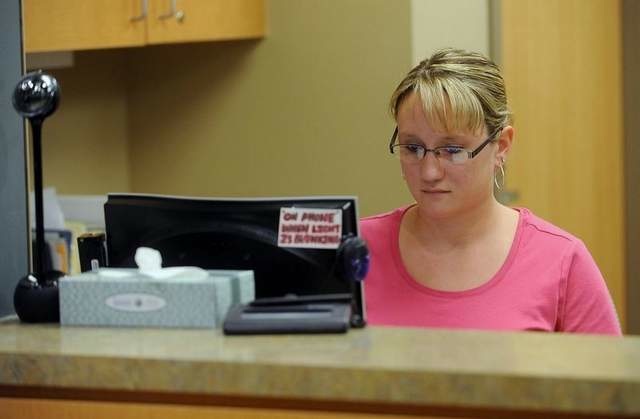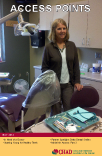Single mom thankful she's 'never had to think twice'

Michelle Reichert works as a patient support technician at Falls Community Health Clinic. Despite working full time, Reichert, a single mom, needs the help of Medicaid to ensure that her three kids have health care coverage. / Elisha Page / Argus Leader
When Michelle Reichert's 5-year-old son recently fell off his bike and cut his face, Reichert found herself in the hospital emergency room.
The accident happened at night on a weekend, and the emergency room was her only option. If it weren't for Medicaid, Reichert would have considered waiting until the next morning.
As it turned out, her son required stitches.
Reichert's three children are enrolled in the federal-state program that provides medical care to the poor. She is not in the program - an example of how a majority of Medicaid participants are children.
Reichert, 29, can't afford to insure her children. "I'm just a single mom," she said. "It's just me."
During the past few months, lawmakers and members of the health industry have been meeting in an effort to find ways to trim costs. The state's share of Medicaid is expected to cost almost $300 million this year - up almost $75 million since 2007.
The sharp increase has cut into other state programs, including K-12 education. In response, members of the health and education industries are proposing a 1-cent sales tax increase to pay for Medicaid and public education.
It's easy to get lost in the numbers. But Reichert's three children are reminders that the program serves a population that otherwise would lack access to health services.
Without the program, Reichert's children might be forced to forgo preventive checkups - which might lead to more costly procedures later. With Medicaid, they get yearly checkups and shots.
"If something emergent happens, I don't have to think twice about taking them somewhere," Reichert said.
And, as officials grapple with the costs and look for new ways to save money, some argue that to achieve long-term savings, you need to spend more up front.
Lawmakers have tried to expand the program so that more pregnant women can qualify for prenatal services, but those efforts have failed because it would be costly to expand services - even though in the long run, it might reduce costly problems that arise with infants.
Reichert says she can't imagine what she would do without the program.
"I've never had to think twice," she said.
Reach reporter Jonathan Ellis at 575-3629.

